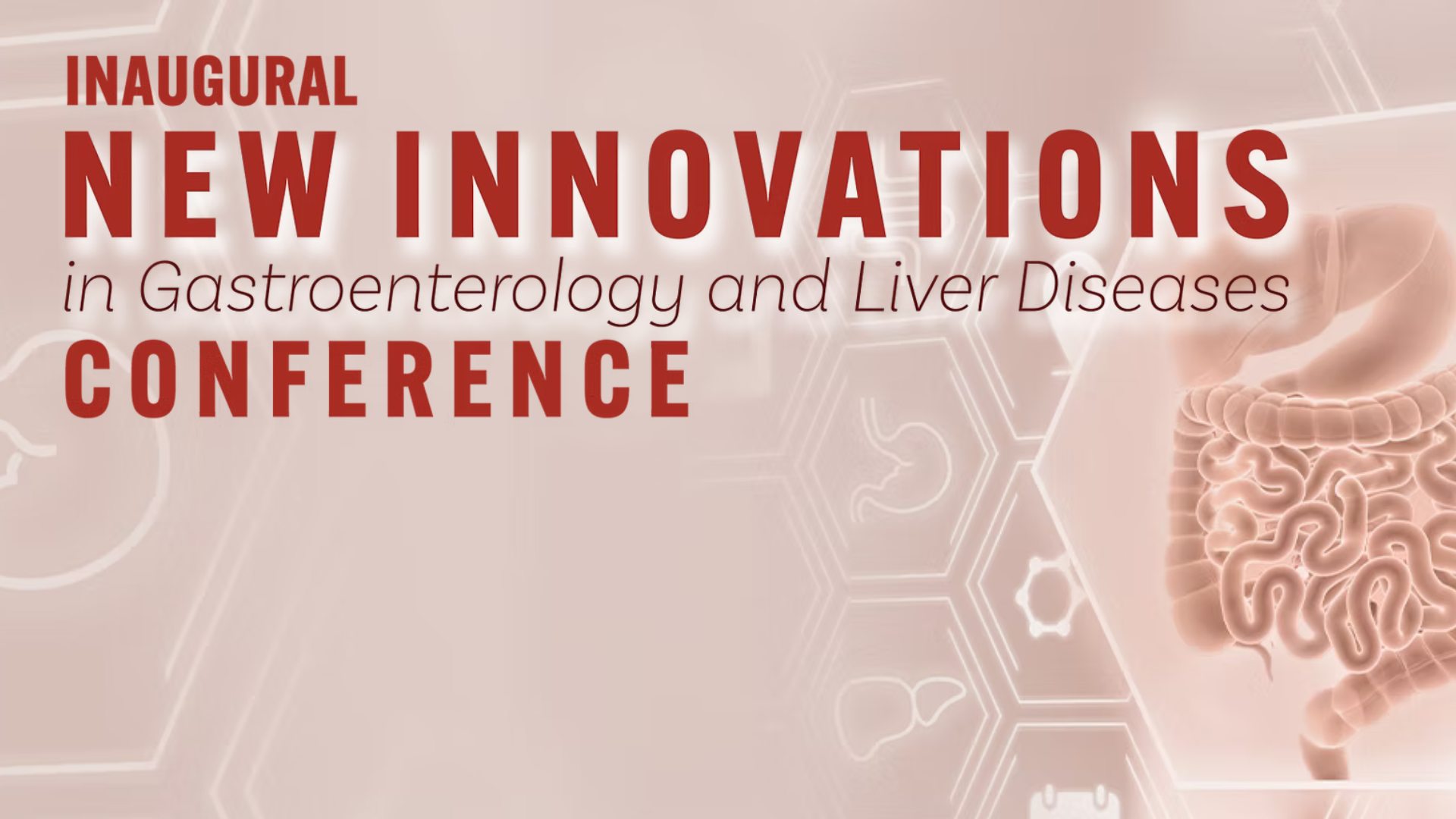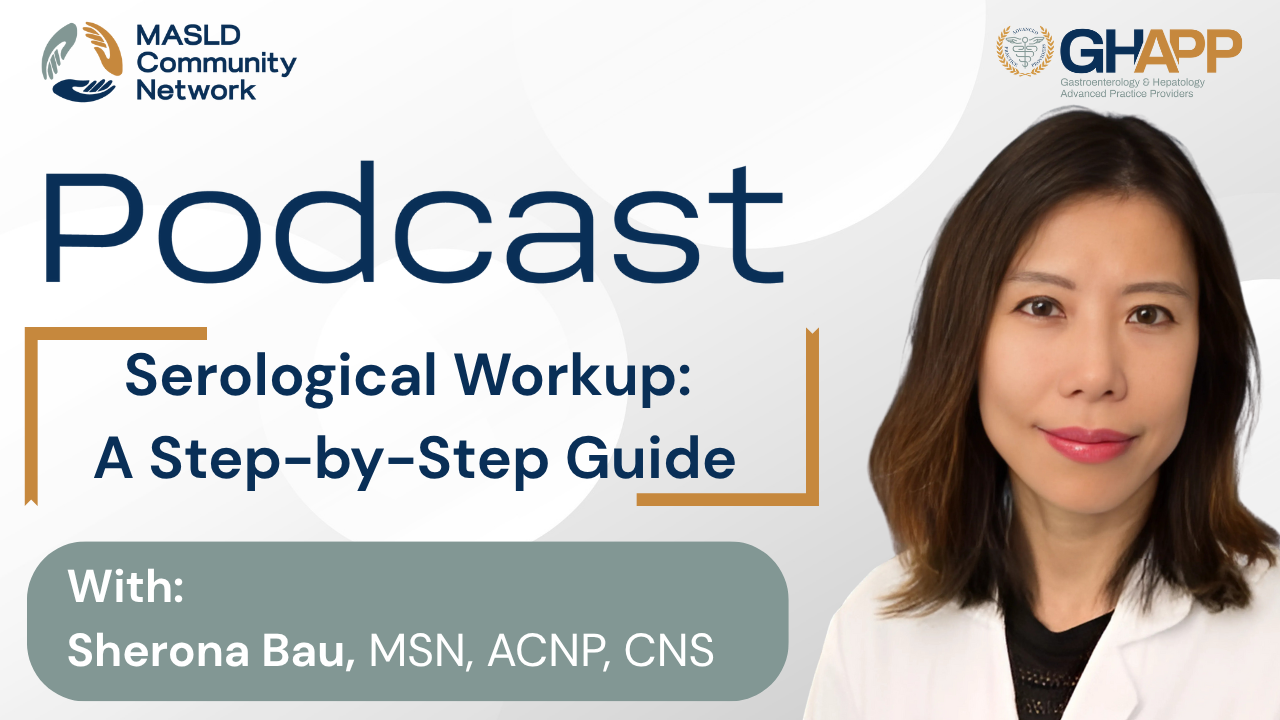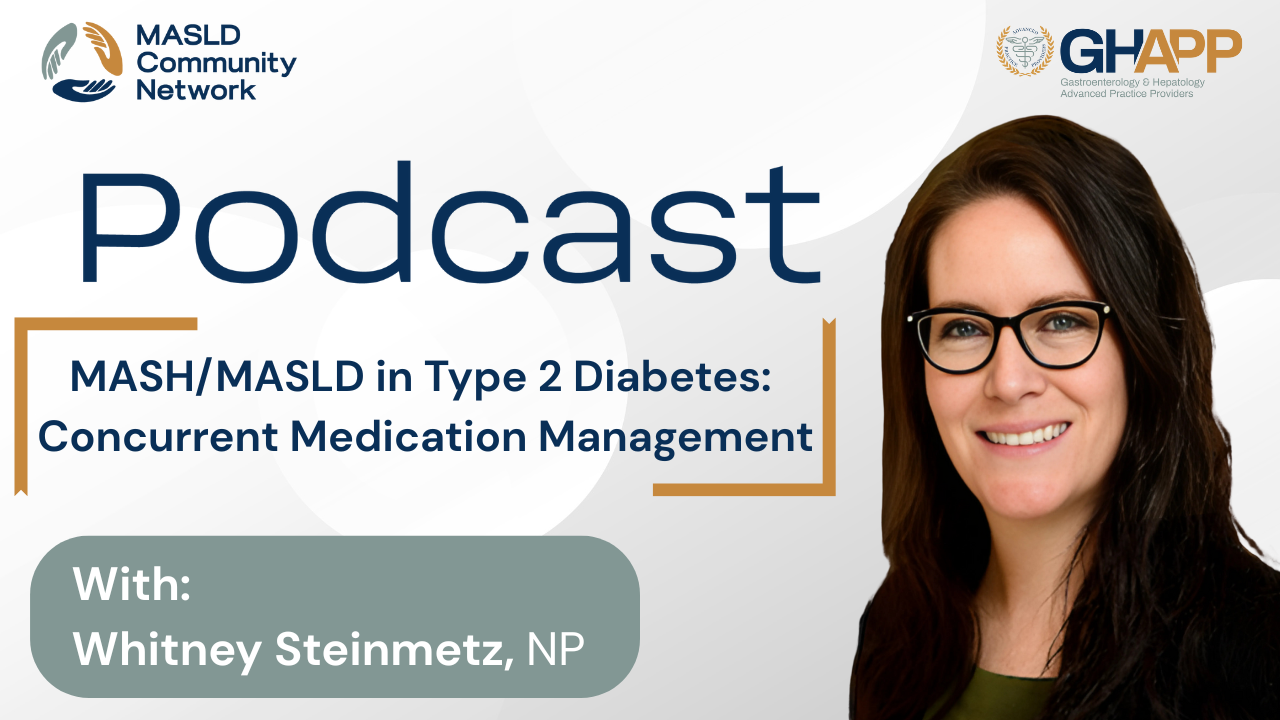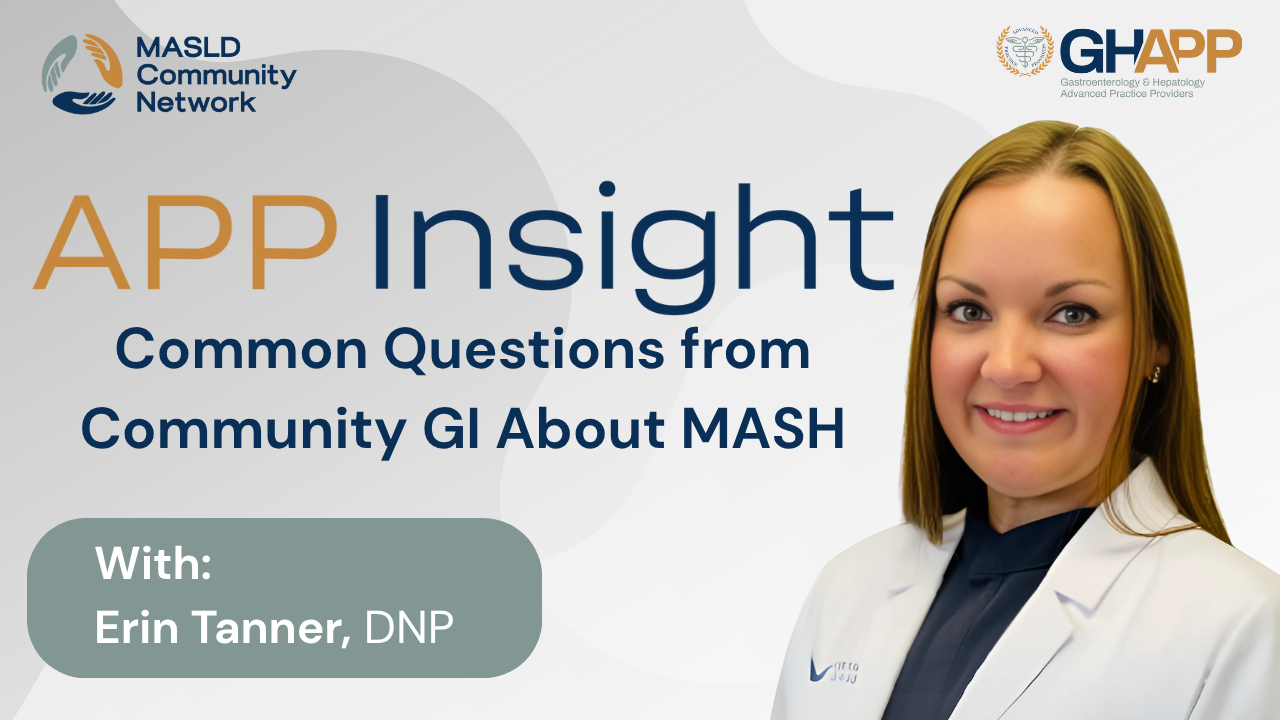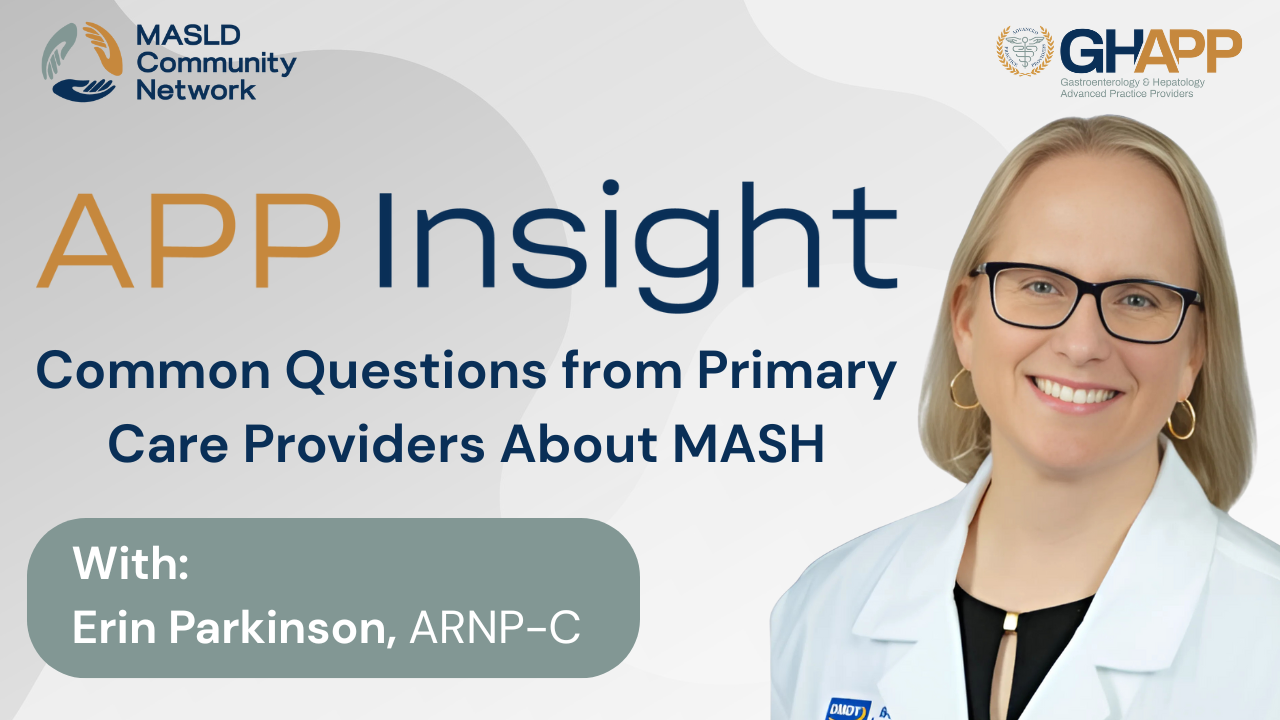
Ellie Gonyeau
NP
Location : Boston, MA, USA
BIO
Ellie Gonyeau is a board-certified Nurse Practitioner specializing in gastroenterology at Beth Israel Deaconess Medical Center (BIDMC) in Boston, Massachusetts. She earned her Nurse Practitioner degree from Simmons University and has been practicing since 2020.
Ellie is affiliated with Cape Cod Hospital and Beth Israel Deaconess Medical Center, providing comprehensive care to patients with various gastrointestinal conditions. She is committed to delivering patient-centered care and building long-term, trusting relationships with her patients.
MASLD-MASH Content Featuring Ellie
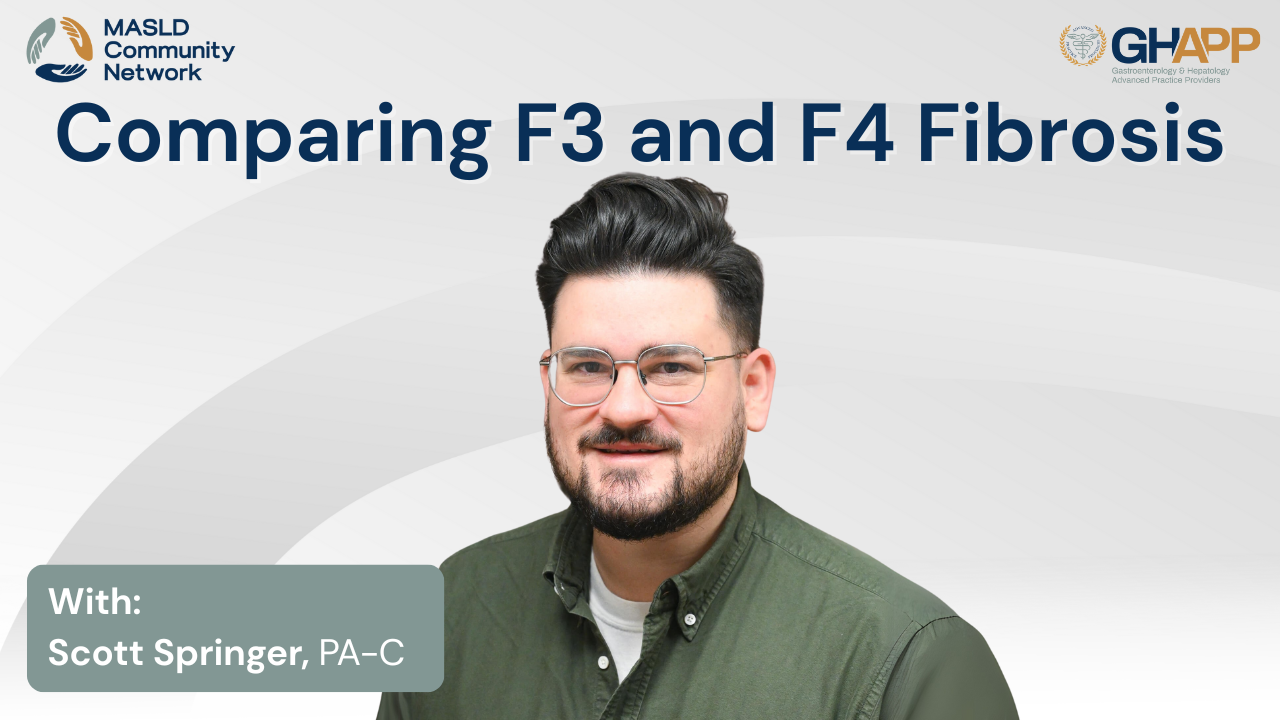
Comparing F3 and F4 Fibrosis With Scott Springer

Join Scott Springer, PA-C, from Erie County Medical Center in Buffalo, NY, for a case-based clinical discussion on how to evaluate and manage F3 vs. F4 fibrosis in patients with Metabolic Dysfunction-Associated Steatotic Liver Disease (MASLD) and MASH, presented through the GHAPP MASLD/MASH Community Network and sponsored by Madrigal Pharmaceuticals. Using a detailed side-by-side comparison of a fictional patient "Sam," Scott demonstrates how to interpret key non-invasive testing modalities—including FIB-4, ELF, and FibroScan—to stage liver fibrosis, determine candidacy for emerging therapies like resmetirom (Rezdiffra), and identify when liver biopsy may still be necessary. Learn how changes in platelet count, ELF score, and liver stiffness (kPa) help distinguish advanced fibrosis (F3) from cirrhosis (F4) and how this affects treatment decisions, HCC surveillance, and portal hypertension management. Scott also emphasizes the role of GLP-1 therapy, aggressive cardiometabolic risk reduction, and lifestyle counseling as core strategies in MASLD care. This session is a practical guide for GI and hepatology providers navigating MASLD staging, treatment eligibility, and long-term monitoring in 2025 and beyond.
Watch Now
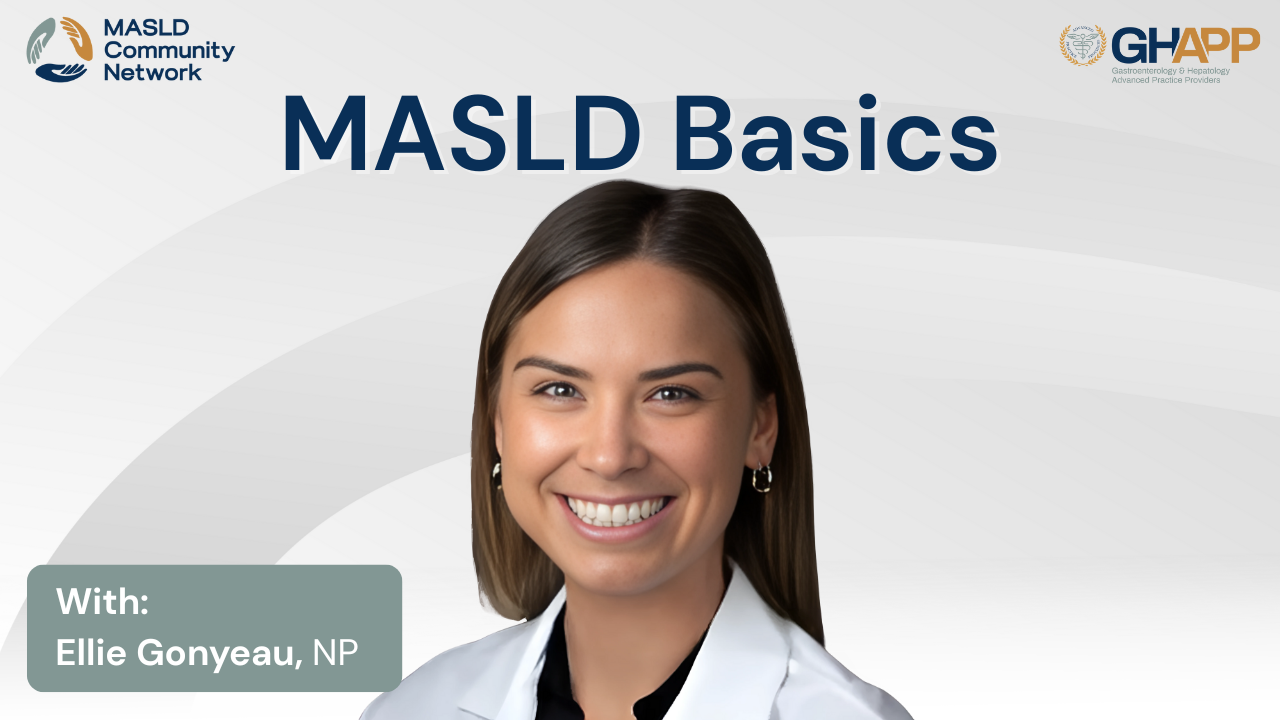
MASLD Basics With Ellie Gonyeau

Join Ellie Gonyeau, NP, a GI and hepatology nurse practitioner at Beth Israel Deaconess Medical Center in Boston, for a foundational overview of Metabolic Dysfunction-Associated Steatotic Liver Disease (MASLD), formerly known as NAFLD. Presented through the GHAPP MASLD Community Network and sponsored by Madrigal Pharmaceuticals, this session covers the latest updates in MASLD nomenclature, diagnostic criteria, and non-invasive evaluation strategies. Ellie walks through the 2023 guidelines, emphasizing how MASLD is defined by hepatic steatosis in the presence of at least one metabolic risk factor—such as obesity, type 2 diabetes, hypertension, or dyslipidemia—and the importance of ruling out excessive alcohol use and other causes of chronic liver disease. Using real-world case examples like "JP", Ellie illustrates how to assess disease severity using tools such as FIB-4, FibroScan, and lab workups, while explaining when to consider specialty referral, further imaging, or liver biopsy. The talk also highlights the alarming rates of MASLD in high-risk populations, such as the Latin American community, and explores the disease's potential to silently progress to MASH, fibrosis, or cirrhosis. Whether you're in primary care, GI, or hepatology, this session provides critical insights on early detection, risk stratification, and guideline-based management of this increasingly prevalent condition.
Watch Now
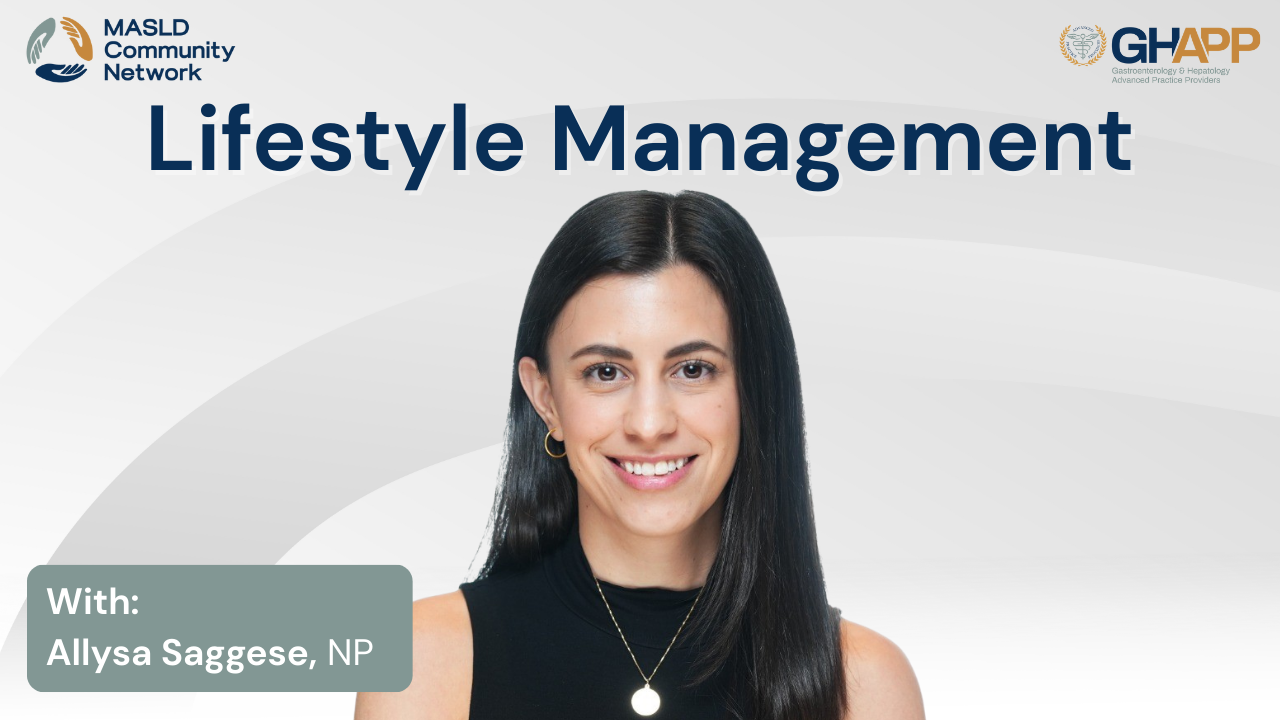
Lifestyle Management With Allysa Saggese

Join Allysa Saggese, NP, from Weill Cornell Medicine in New York City, for an insightful and practical discussion on lifestyle management for MASLD and MASH, presented through the GHAPP MASLD/MASH Community Network, sponsored by Madrigal Pharmaceuticals. In this case-based presentation, Allysa walks viewers through the non-pharmacologic strategies used to manage Metabolic Dysfunction-Associated Steatotic Liver Disease (MASLD), highlighting the role of nutrition, physical activity, and patient-centered counseling. Using a real-world example of a 65-year-old patient with obesity, diabetes, and steatosis, Allysa demonstrates how to assess fibrosis risk through non-invasive testing like FIB-4 and FibroScan, and explains how lifestyle modifications remain central to slowing disease progression—even in the era of advanced therapeutics. The session explores the importance of motivational interviewing, cultural dietary preferences, and how to structure effective, individualized conversations around reducing sugar intake, increasing movement at home, and achieving sustainable 5–10% weight loss to improve liver histology. Allysa also breaks down the metabolic interplay between central adiposity, insulin resistance, and liver inflammation, and shares counseling tips to build patient trust and long-term engagement. Whether you're a GI or hepatology provider, this session delivers real-world guidance to help empower patients to reverse early liver damage through everyday lifestyle changes.
Watch Now
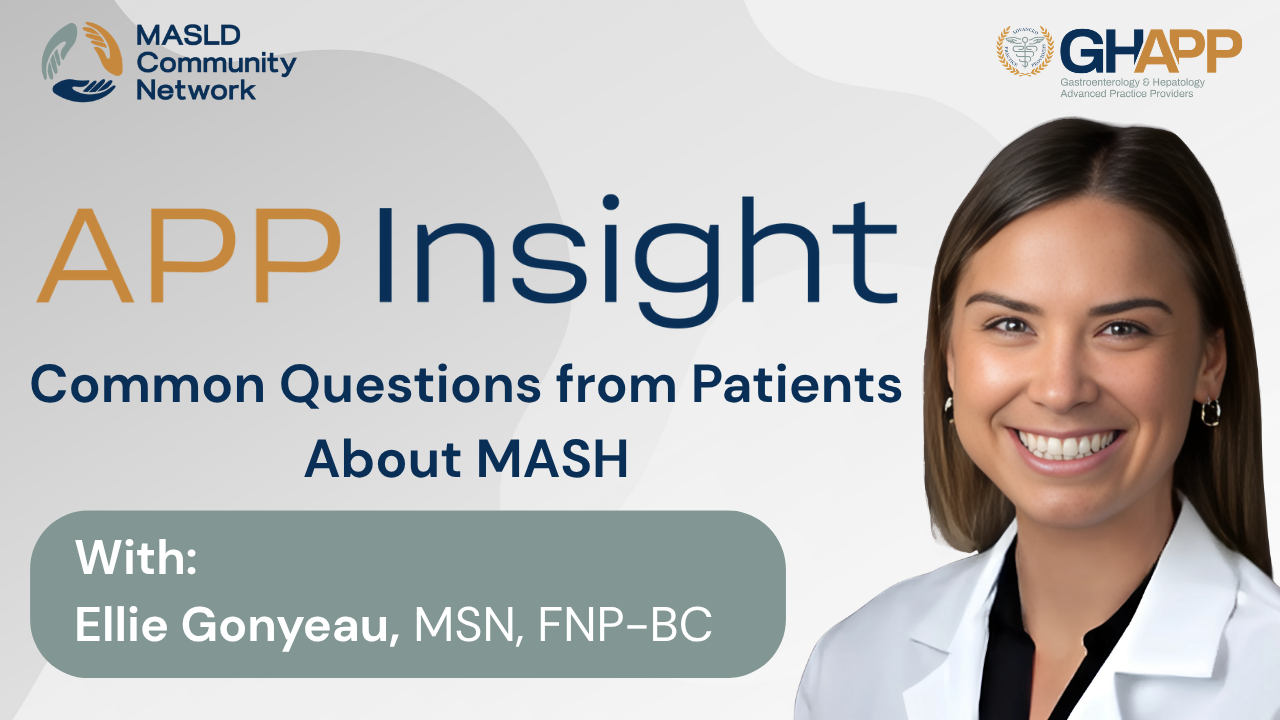
Common Questions From Patients About MASH

In this informative video, Ellie Gonyeau, a nurse practitioner in general gastroenterology at Beth Israel in Boston, answers some of the most common questions she hears from patients about MASLD (Metabolic dysfunction-Associated Steatotic Liver Disease). With compassion and clarity, Ellie addresses concerns about the seriousness of the condition, explaining that while MASLD can progress to advanced liver disease, early intervention can make a significant difference. She emphasizes the importance of not delaying care and encourages patients to take manageable steps—like losing just 5–10% of their body weight—to reduce liver inflammation and slow disease progression. Nutrition, exercise, and proactive conversations are central to her patient-centered approach. Whether you're newly diagnosed or seeking guidance, this episode offers valuable, practical insights for anyone navigating MASLD. #MASLD #FattyLiver #LiverHealth #GIcare #BethIsrael #NursePractitioner #Gastroenterology #PatientEducation #LiverDisease #WeightLossSupport
Watch Now

Clinical Deep Dive: Unlocking the Treatment Potential of Rezdiffra

This educational discussion dives into Rezdiffra, the first and only FDA-approved therapy for non-cirrhotic metabolic-associated steatohepatitis (MASH) with moderate to advanced fibrosis. The talk provides a clinical deep dive into the progression of MASH and fibrosis, highlighting the risks of untreated disease and the importance of early intervention. A key focus is the thyroid hormone receptor beta mechanism, explaining how Rezdiffra directly targets liver-specific pathways to reduce hepatic fat accumulation and fibrosis. Additionally, the discussion covers the rigorous FDA approval process and dual efficacy endpoints, detailing how Rezdiffra achieved significant fibrosis improvement and steatohepatitis resolution in the MAESTRO-NASH trial. The session also provides practical insights into patient access, prescribing considerations, and managing common side effects. With over 2,000 patients studied, Rezdiffra has demonstrated a strong safety profile and offers a once-daily oral treatment option that represents a major advancement in MASH management. This discussion is essential for gastroenterologists, hepatologists, and endocrinologists managing patients with MASH, as well as primary care providers and cardiologists who play a role in identifying at-risk individuals. If you are a healthcare professional looking to stay updated on the latest MASH research and treatment strategies, this session provides the insights you need.
Watch Now

Management of Life Style Modification

This video focuses on the comprehensive management of patients with metabolic-associated steatohepatitis (MASH), emphasizing lifestyle modifications, dietary adjustments, and exercise strategies. Key topics include the importance of addressing risk factors like diet, exercise habits, and alcohol intake, as well as referrals to medically supervised weight loss clinics or bariatric surgery for advanced cases. The speaker highlights the benefits of the Mediterranean diet, intermittent fasting, and avoiding ultra-processed foods while discussing the role of resistance training to combat sarcopenia and maintain muscle mass. Practical advice and tailored recommendations ensure a holistic approach to managing MASH and improving patient outcomes.
Watch Now

Third Step of Life Style Management

This video provides a comprehensive overview of emerging pharmacologic treatments for metabolic-associated steatohepatitis (MASH) and their tailored applications based on patient profiles. Topics include FDA-approved therapies, drugs in advanced clinical trials (such as semaglutide and lanifibranor), and the potential for combination treatments targeting both steatohepatitis and fibrosis. The speaker emphasizes the importance of patient-specific approaches considering metabolic profiles, obesity, and diabetes status, alongside lifestyle interventions. Additionally, the video discusses the evolving interdisciplinary care model and highlights the exciting progress in non-invasive testing and treatment advancements for F2-F3 fibrosis.
Watch Now

Approved Medication for MASH/NASH

This video provides detailed guidance on selecting and monitoring patients for emerging therapies targeting advanced fibrosis (F2-F3) in NASH. Key topics include contraindications for patients with cirrhosis, considerations for concomitant medications, and dose adjustments for statins. The video outlines ideal candidates based on specific thresholds for VCTE, MRE, ELF scores, and other non-invasive tests while emphasizing the importance of ruling out portal hypertension and other liver diseases. It also reviews a stepwise monitoring approach, focusing on tolerability at three months and efficacy assessments at six and twelve months, with an emphasis on histologic and non-invasive test improvements.
Watch Now

Types of Diet for the Treatment of MASLD

This video explores comprehensive strategies for managing metabolic-associated steatohepatitis (MASH), focusing on fibrosis risk stratification, lifestyle modifications, and pharmacologic interventions. Learn about dietary recommendations like the Mediterranean diet, exercise guidelines emphasizing resistance training, and the role of intermittent fasting and processed food avoidance. The video also highlights weight loss targets, diabetes management, and emerging therapies such as GLP-1 receptor agonists and bariatric surgery, all aimed at improving liver health and patient outcomes.
Watch Now

NITs to Identify High Risk MASH Patients

Explore advancements in non-invasive diagnostics and risk stratification for liver fibrosis and MASH. This video highlights tools like FIB-4, transient elastography, and innovative scoring systems (e.g., FAST and Agile) to identify and predict outcomes for high-risk patients. Learn about serum biomarkers, updated guidelines, and the role of lifestyle interventions alongside targeted therapies for managing metabolic risks and advancing care in hepatology.
Watch Now

NITs: A Practical Overview: Navigating the Basics

Join Ellie Gonyeau, a nurse practitioner at Beth Israel in Boston, for an insightful podcast episode on metabolic dysfunction-associated steatotic liver disease (MASLD) and MASH, and how to effectively use non-invasive testing (NITs) to evaluate and manage patients with fatty liver disease. Ellie breaks down the differences between MASLD and MASH—explaining why distinguishing simple steatosis from inflammatory liver injury matters for long-term outcomes. She covers first-line serum-based tools like FIB-4 and ELF score, as well as imaging-based modalities including FibroScan and MR elastography, helping clinicians understand when and how to apply each test. With practical tips on interpreting fibrosis risk thresholds, stratifying patients with metabolic comorbidities, and educating primary care teams, this episode emphasizes the power of early identification, appropriate triage, and collaborative care to prevent disease progression. Whether you're working in general GI, primary care, or hepatology, this episode equips you with tools to make liver disease detection more proactive and patient-centered.
Watch Now

Differentiating Between F3 and F4

In this comprehensive discussion, HoChong Gilles, a nurse practitioner with 25 years of hepatology experience at the Richmond VA Medical Center, explores the critical importance of accurately distinguishing between F3 (advanced fibrosis) and F4 (cirrhosis) in patients with MASH (metabolic-associated steatohepatitis). While both stages carry increased risks of liver-specific and overall mortality, Gilles explains that F3 may still be reversible with lifestyle changes or pharmacotherapy, whereas F4 signals irreversible liver damage with heightened risk of complications like portal hypertension, hepatic encephalopathy, and liver cancer. Viewers will gain a deeper understanding of how non-invasive tests—like FIB-4, ELF, FibroScan, and MRE—perform in identifying fibrosis stage, including their limitations and overlaps. Gilles also outlines when to consider liver biopsy, especially in cases with discordant test results, atypical features, or clinical uncertainty. This video emphasizes how staging accuracy informs eligibility for therapies, surveillance strategies like HCC screening, and overall prognosis. Learn how to approach this nuanced distinction in clinical practice and why F3 vs. F4 isn't just semantics—it's a turning point in patient care.
Watch Now

Addressing Health Disparities: Equity Considerations in MASH/MASLD Care

In this episode, Patrick Horne, NP at the University of Florida (UF Health), explores the impact of health disparities and socioeconomic inequality on the diagnosis and management of MASH (metabolic-associated steatohepatitis) and MASLD (metabolic dysfunction-associated steatotic liver disease). With a focus on rural and underserved populations, Patrick discusses how limited access to quality healthcare, healthy food, exercise options, and non-invasive testing (NITs) like FibroScan or MRI elastography can delay diagnosis and worsen outcomes. He shares practical, empathetic strategies for individualizing care, such as using accessible tools like FIB-4 or APRI, promoting low-cost physical activity like walking or swimming, and providing culturally sensitive nutrition advice tailored to financial and geographic realities. Patrick emphasizes the provider’s role as a patient advocate and coach, helping patients navigate barriers and create sustainable lifestyle modifications. This episode offers key insights for clinicians working to close gaps in care and promote equity in liver disease management.
Watch Now

Pharmacotherapy Review

Join Christina Hanson, FNP-C, from South Denver Gastroenterology, as she provides an in-depth overview of the current pharmacologic treatment landscape for Metabolic Dysfunction-Associated Steatotic Liver Disease (MASLD) and Metabolic Dysfunction-Associated Steatohepatitis (MASH). This expert-led session explores the three cornerstones of MASH management—lifestyle and weight loss interventions, cardiovascular risk reduction, and liver-directed therapy—while highlighting the evolving role of GLP-1 receptor agonists and the recent FDA approval of resmetirom, the first medication indicated for adults with MASH and moderate to advanced fibrosis. Christina also discusses clinical trial data from MAESTRO-NASH, reviews historical agents like vitamin E and pioglitazone, and offers practical guidance on patient selection, safety considerations, and monitoring strategies. Whether you’re a GI provider, hepatology specialist, or primary care clinician managing fatty liver disease, this video provides valuable insights into how emerging therapies are shaping the future of MASH treatment.
Watch Now

Liver Model Overview

Join Alison Moe, PA-C with United Digestive, as she walks through a hands-on demonstration using a life-sized liver model to help patients better understand fibrosis and liver disease progression. In this engaging and practical overview, Allison explains how different stages of liver fibrosis—from normal liver to cirrhosis and hepatocellular carcinoma—can be felt and visualized using a segmented anatomical model. She shares how this tool enhances patient education during discussions about non-invasive liver testing, such as FibroScan, CAP scores, FIB-4, ELF testing, and more. Designed to support visual learners and improve comprehension of disease state, this video is a valuable resource for clinicians and patients navigating the complexities of metabolic-associated fatty liver disease (MASLD) and its progression to MASH. Learn how tactile and visual teaching aids can bridge the gap between diagnostics and patient understanding in hepatology care.
Watch Now
FAQ's

Common Questions From Patients About MASH

In this informative video, Ellie Gonyeau, a nurse practitioner in general gastroenterology at Beth Israel in Boston, answers some of the most common questions she hears from patients about MASLD (Metabolic dysfunction-Associated Steatotic Liver Disease). With compassion and clarity, Ellie addresses concerns about the seriousness of the condition, explaining that while MASLD can progress to advanced liver disease, early intervention can make a significant difference. She emphasizes the importance of not delaying care and encourages patients to take manageable steps—like losing just 5–10% of their body weight—to reduce liver inflammation and slow disease progression. Nutrition, exercise, and proactive conversations are central to her patient-centered approach. Whether you're newly diagnosed or seeking guidance, this episode offers valuable, practical insights for anyone navigating MASLD. #MASLD #FattyLiver #LiverHealth #GIcare #BethIsrael #NursePractitioner #Gastroenterology #PatientEducation #LiverDisease #WeightLossSupport
Watch Now







